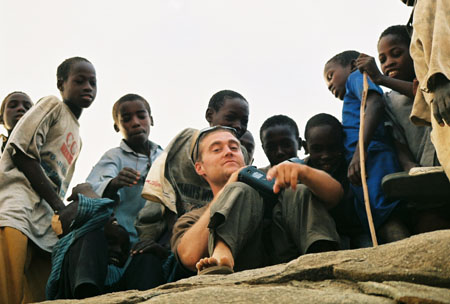

Reviews of Recent Independent, Foreign, & Documentary Films in Theaters and DVD/Home Video
Directed by: Annie Sundberg & Ricki Stern. Produced by: Sundberg, Stern, Gretchen Steidle Wallace, Jane Wells, Ira Lechner, Eileen Haag & Cristina Ljungberg. Director of Photography: Jerry Risius, Phil Cox, Tim Hetherington, William Rexer II, Sundberg & John Keith Wasson. Edited by: Joey Grossfield. Music by: Paul Brill. Released by: International Film Circuit. Language: English, Arabic & African languages with English subtitles. Country of Origin: USA. 85 minutes. Not Rated. A searing primer on the human rights disaster in Darfur, The Devil Came on Horseback goes beyond emotional rhetoric by focusing on the eyewitness accounts of former U.S. Marine Captain Brian Steidle. In doing so, directors Annie Sundberg and Ricki Stern surmount the cliché viewing of third world tragedies through the eyes of an idealistic white expatriate. Steidle’s proud family tradition of military service stretches back to the Revolutionary War. He grew up on Army bases around the world and completed his own military service in 2003. Restless with Marine bureaucracy, he found a job on the Internet as a patrol leader for African Union ceasefire monitors. He arrives in western Sudan in January 2004 with knowledge gleaned from library books and “armed only with pen, paper, and camera.” He volunteers to go deeper and deeper into Darfur, and his meticulous and horrific reports with photographed evidence of atrocious ceasefire violations are filed to no avail. His smuggled out copies form the visual and narrative core here, supplemented by correspondence with his sister, Gretchen Steidle Wallace, and radio and television journalists’ daring footage and interviews. Detailed maps and useful contextual explanations go beyond the usual press short hand of evil “Arab north” and the innocent “Christian or animist south.” The documentary carefully traces the economic and political forces that erupted in Darfur with the expanding oil fields exporting product mostly to China. Steidle realizes the Sudanese government, despite its public denials, supplies the roving Janjaweed militias and supports them with air power, though distinguishing the rebels against the government from the Janjaweed is sometimes confusing. What is startlingly and explicitly captured, though, are the plight of civilians caught in the middle of systematic, wholesale destruction of large villages; Steidle's explicit photographs document how torture and rape preceded gruesome deaths. He even identifies a pattern of attacks, but constrained by his role as a monitor, he can’t stop the atrocities. His frustration and helplessness is palpably felt, and his humanitarian and military instincts continue to haunt him when he returns home. After restlessly searching his conscience, he is convinced by his sister to share his documentation with New York Times columnist Nicholas Kristof. The filmmakers follow him in the resulting media and political maelstrom, capturing his rising confidence in public speaking, though soft pedaling the transformative role of the increasing activism of his sister, one of the film’s producers. She was simultaneously working with women in developing countries through various international organizations, and her brother’s experience influenced her to establish an organization for genocide survivors and co-author his memoir, The Devil Came on Horseback: Bearing Witness to the Genocide in Darfur. Ever hopeful, Steidle and Wallace visit Rwanda to see if there can be healing after genocide. Particularly striking are interviews Steidle conducts with bereft, shell-shocked survivors in refugee camps in Chad. These brief, eloquent pleas for human dignity provide a much needed three-dimensional examination of refugees, but cry out for expansion – more about them and less about the Americans. In the press notes, the filmmakers mention the film’s participants risked Sudan government reprisals – their translator was briefly arrested after they left. The film takes on the issue of whether the conflict is a long-running brutal civil war, in which the international community has limited grounds to intervene, or a programmed genocide based on race and religion. Clips familiar from television recount aid organizations fleeing the region, the violence spreading to Chad, the U.S. government and the U.N. Security Council declaring genocide and sanctions, and the International Criminal Court gathering evidence, including Steidle’s, to bring war crime charges, but the refugee and death numbers keep rising.
The Devil Came on Horseback reinforces the importance of eyewitness testimony, as in films such as Screamers, about the Armenian
genocide, and Sometimes in April,
about Rwanda. But the difference here is that
this violence is happening now and tantalizingly could be stopped.
Nora Lee Mandel
|